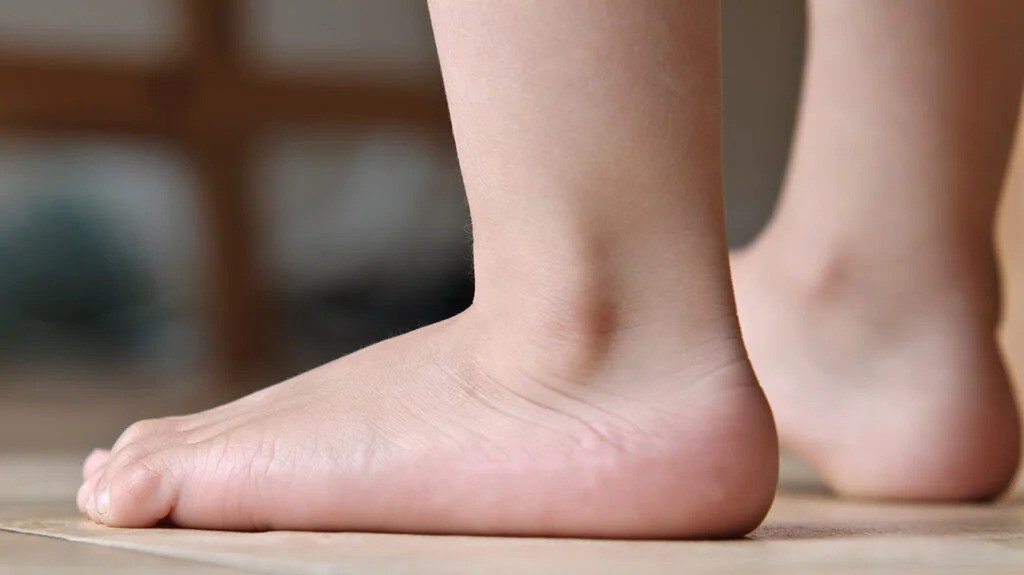Flat feet, also known as fallen arches, can significantly impact your overall health, potentially leading to joint problems, arthritis, and lower back pain. It is important to recognize this condition early to manage symptoms effectively and possibly avoid surgical intervention.
What Are Flat Feet?
Flat feet occur when the arches of the feet collapse, causing the entire sole to make contact with the ground. This condition can present at a young age or develop later in life. People with flat feet often experience discomfort in the feet and legs, which can lead to more serious health issues if not addressed.
Causes of Flat Feet
Flat feet can result from several factors, including:
- Genetics: A family history of flat feet can increase the likelihood of developing the condition.
- Obesity: Excess weight puts additional strain on the feet and can contribute to the flattening of the arches.
- Diabetes: High blood sugar levels can affect foot health and contribute to flat feet.
- Aging: As people get older, the tendons in the feet may weaken, causing the arches to fall.
- Previous Injuries: Past injuries to the feet or ankles can lead to the development of flat feet.
Studies indicate that about 10-20% of the population experiences flat feet, affecting both children and adults. Early recognition and management are essential to prevent further complications.
Types of Flat Feet
Flat feet are generally categorized into two main types:
- Flexible Flat Feet
This type is common in children. The arch may appear normal when the child is not walking but flattens out during walking or standing. Flexible flat feet are less severe and often improve with time. - Rigid Flat Feet
In this type, the arch remains flat whether the person is standing or sitting. Rigid flat feet can lead to more serious issues and require closer medical attention.
Symptoms of Flat Feet
The symptoms of flat feet can vary but often include:
- Foot Fatigue: Discomfort or tiredness in the feet after prolonged standing or walking.
- Pain: Pain may be felt along the inner side of the feet and can extend to the calves, knees, hips, and lower back.
- Swelling: Prolonged standing or walking may lead to swelling in the feet.
Recognizing these symptoms early can help in seeking appropriate treatment and preventing more severe conditions.
Diagnosing and Treating Flat Feet
Early diagnosis of flat feet is important for effective treatment and to prevent the development of joint problems and arthritis.
Diagnosis
A doctor may perform various tests to diagnose flat feet, including:
- Physical Examination: Evaluating the arch and alignment of the feet.
- Imaging Tests: X-rays or CT scans to assess the condition of the bones and tendons in the feet.
Treatment Options
Several treatment methods are available to manage flat feet:
- Exercises: Strengthening and stretching exercises can help alleviate pain and improve foot function.
- Supportive Insoles: Custom insoles and well-fitted shoes can provide the necessary support for flat feet.
- Weight Management: Losing excess weight can reduce strain on the feet and alleviate symptoms.
- Physiotherapy: Professional therapy can guide you through exercises and techniques to relieve discomfort.
- Medication: Pain-relieving medications and ice packs can manage pain and swelling.
In severe cases where these methods are ineffective, surgery might be considered to correct the alignment of the foot bones. However, early treatment is generally more effective and less invasive.
Conclusion
Flat feet can lead to a range of issues, including joint degeneration, arthritis, and low back pain. Addressing the condition early through proper treatment can alleviate symptoms and help avoid more invasive procedures later. Simple measures such as exercises, supportive footwear, and weight management can make a significant difference.
Always consult with your doctor or a healthcare professional before making significant dietary changes for your health conditions. They can provide personalized guidance based on your medical history and current health status.
Note: If you have any health-related concerns, please call us at +91-9058577992 to receive a free consultation from our experienced doctors. Thank you.
By recognizing the symptoms of flat feet and seeking timely treatment, you can manage the condition effectively and improve your quality of life.
